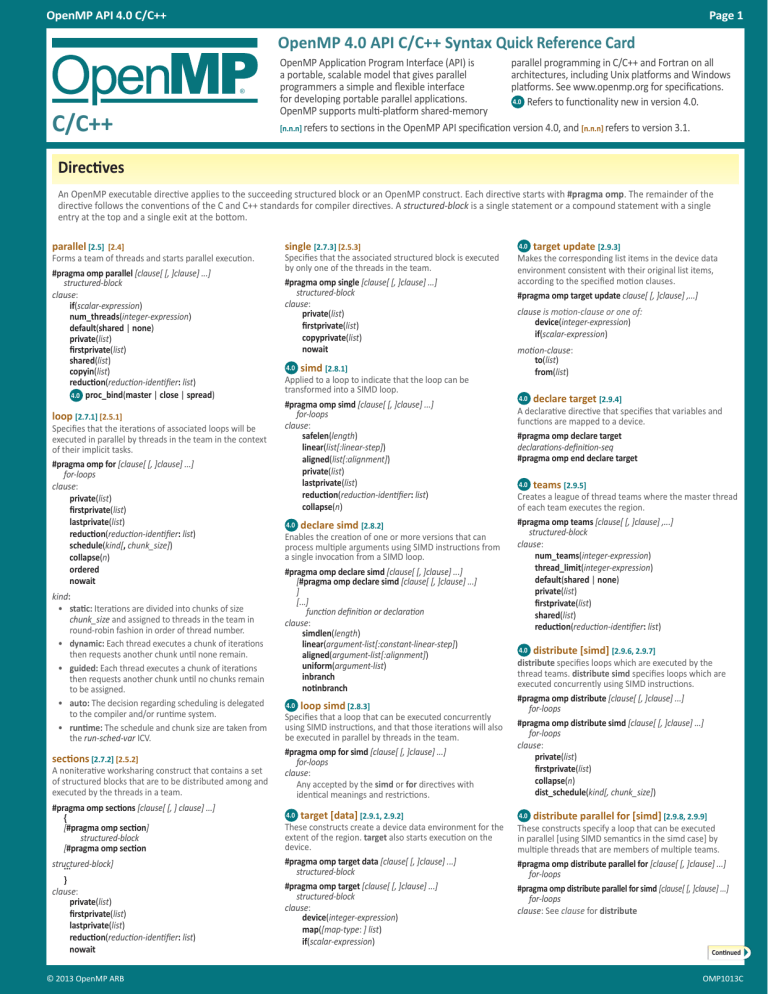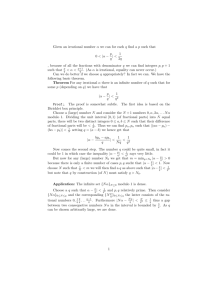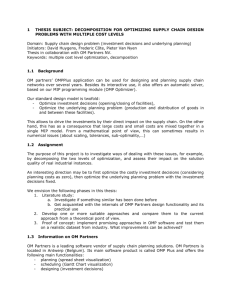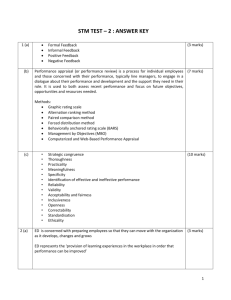OpenMP 4.0 Summary Card
advertisement

OpenMP API 4.0 C/C++
Page 1
OpenMP 4.0 API C/C++ Syntax Quick Reference Card
®
C/C++
OpenMP Application Program Interface (API) is
parallel programming in C/C++ and Fortran on all
a portable, scalable model that gives parallel
architectures, including Unix platforms and Windows
programmers a simple and flexible interface
platforms. See www.openmp.org for specifications.
for developing portable parallel applications.
4.0 Refers to functionality new in version 4.0.
OpenMP supports multi-platform shared-memory
[n.n.n] refers to sections in the OpenMP API specification version 4.0, and [n.n.n] refers to version 3.1.
Directives
An OpenMP executable directive applies to the succeeding structured block or an OpenMP construct. Each directive starts with #pragma omp. The remainder of the
directive follows the conventions of the C and C++ standards for compiler directives. A structured-block is a single statement or a compound statement with a single
entry at the top and a single exit at the bottom.
parallel [2.5]
[2.4]
Forms a team of threads and starts parallel execution.
#pragma omp parallel [clause[ [, ]clause] ...]
structured-block
clause:
if(scalar-expression)
num_threads(integer-expression)
default(shared | none)
private(list)
firstprivate(list)
shared(list)
copyin(list)
reduction(reduction-identifier: list)
4.0 proc_bind(master | close | spread)
loop [2.7.1] [2.5.1]
Specifies that the iterations of associated loops will be
executed in parallel by threads in the team in the context
of their implicit tasks.
#pragma omp for [clause[ [, ]clause] ...]
for-loops
clause:
private(list)
firstprivate(list)
lastprivate(list)
reduction(reduction-identifier: list)
schedule(kind[, chunk_size])
collapse(n)
ordered
nowait
kind:
• static: Iterations are divided into chunks of size
chunk_size and assigned to threads in the team in
round-robin fashion in order of thread number.
• dynamic: Each thread executes a chunk of iterations
then requests another chunk until none remain.
• guided: Each thread executes a chunk of iterations
then requests another chunk until no chunks remain
to be assigned.
• auto: The decision regarding scheduling is delegated
to the compiler and/or runtime system.
• runtime: The schedule and chunk size are taken from
the run-sched-var ICV.
sections [2.7.2] [2.5.2]
A noniterative worksharing construct that contains a set
of structured blocks that are to be distributed among and
executed by the threads in a team.
#pragma omp sections [clause[ [, ] clause] ...]
{
[#pragma omp section]
structured-block
[#pragma omp section
structured-block]
...
}
clause:
private(list)
firstprivate(list)
lastprivate(list)
reduction(reduction-identifier: list)
nowait
© 2013 OpenMP ARB
single [2.7.3] [2.5.3]
Specifies that the associated structured block is executed
by only one of the threads in the team.
#pragma omp single [clause[ [, ]clause] ...]
structured-block
clause:
private(list)
firstprivate(list)
copyprivate(list)
nowait
4.0
simd [2.8.1]
Applied to a loop to indicate that the loop can be
transformed into a SIMD loop.
#pragma omp simd [clause[ [, ]clause] ...]
for-loops
clause:
safelen(length)
linear(list[:linear-step])
aligned(list[:alignment])
private(list)
lastprivate(list)
reduction(reduction-identifier: list)
collapse(n)
4.0
declare simd [2.8.2]
Enables the creation of one or more versions that can
process multiple arguments using SIMD instructions from
a single invocation from a SIMD loop.
#pragma omp declare simd [clause[ [, ]clause] ...]
[#pragma omp declare simd [clause[ [, ]clause] ...]
]
[...]
function definition or declaration
clause:
simdlen(length)
linear(argument-list[:constant-linear-step])
aligned(argument-list[:alignment])
uniform(argument-list)
inbranch
notinbranch
4.0
loop simd [2.8.3]
Specifies that a loop that can be executed concurrently
using SIMD instructions, and that those iterations will also
be executed in parallel by threads in the team.
#pragma omp for simd [clause[ [, ]clause] ...]
for-loops
clause:
Any accepted by the simd or for directives with
identical meanings and restrictions.
4.0
target [data] [2.9.1, 2.9.2]
These constructs create a device data environment for the
extent of the region. target also starts execution on the
device.
#pragma omp target data [clause[ [, ]clause] ...]
structured-block
#pragma omp target [clause[ [, ]clause] ...]
structured-block
clause:
device(integer-expression)
map([map-type: ] list)
if(scalar-expression)
4.0
target update [2.9.3]
Makes the corresponding list items in the device data
environment consistent with their original list items,
according to the specified motion clauses.
#pragma omp target update clause[ [, ]clause] ,...]
clause is motion-clause or one of:
device(integer-expression)
if(scalar-expression)
motion-clause:
to(list)
from(list)
4.0
declare target [2.9.4]
A declarative directive that specifies that variables and
functions are mapped to a device.
#pragma omp declare target
declarations-definition-seq
#pragma omp end declare target
4.0
teams [2.9.5]
Creates a league of thread teams where the master thread
of each team executes the region.
#pragma omp teams [clause[ [, ]clause] ,...]
structured-block
clause:
num_teams(integer-expression)
thread_limit(integer-expression)
default(shared | none)
private(list)
firstprivate(list)
shared(list)
reduction(reduction-identifier: list)
4.0
distribute [simd] [2.9.6, 2.9.7]
distribute specifies loops which are executed by the
thread teams. distribute simd specifies loops which are
executed concurrently using SIMD instructions.
#pragma omp distribute [clause[ [, ]clause] ...]
for-loops
#pragma omp distribute simd [clause[ [, ]clause] ...]
for-loops
clause:
private(list)
firstprivate(list)
collapse(n)
dist_schedule(kind[, chunk_size])
4.0
distribute parallel for [simd] [2.9.8, 2.9.9]
These constructs specify a loop that can be executed
in parallel [using SIMD semantics in the simd case] by
multiple threads that are members of multiple teams.
#pragma omp distribute parallel for [clause[ [, ]clause] ...]
for-loops
#pragma omp distribute parallel for simd [clause[ [, ]clause] ...]
for-loops
clause: See clause for distribute
4
Continued
OMP1013C
OpenMP API 4.0 C/C++
Page 2
Directives (Continued)
parallel loop [2.10.1] [2.6.1]
Shortcut for specifying a parallel construct containing one
or more associated loops and no other statements.
#pragma omp parallel for [clause[ [, ]clause] ...]
for-loop
clause: Any accepted by the parallel or for directives,
except the nowait clause, with identical meanings and
restrictions.
parallel sections [2.10.2] [2.6.2]
Shortcut for specifying a parallel construct containing one
sections construct and no other statements.
#pragma omp parallel sections [clause[ [, ]clause] ...]
{
[#pragma omp section]
structured-block
[#pragma omp section
structured-block]
...
}
clause: Any of the clauses accepted by the parallel or
sections directives, except the nowait clause, with
identical meanings and restrictions.
4.0
parallel loop simd [2.10.4]
Shortcut for specifying a parallel construct containing one
loop SIMD construct and no other statements.
#pragma omp parallel for simd [clause[ [, ]clause] ...]
for-loops
clause: Any accepted by the parallel, for or simd
directives, except the nowait clause, with identical
meanings and restrictions.
4.0
target teams [2.10.5]
Shortcut for specifying a target construct containing a
teams construct.
#pragma omp target teams [clause[ [, ]clause] ...]
structured-block
clause: See clause for target or teams
4.0
teams distribute [simd] [2.10.6, 2.10.7]
Shortcuts for specifying a teams construct containing a
distribute [simd] construct.
#pragma omp teams distribute [clause[ [, ]clause] ...]
for-loops
#pragma omp teams distribute simd [clause[ [, ]clause] ...]
for-loops
clause: Any clause used for teams or distribute [simd]
4.0
target teams distribute [simd] [2.10.8, 2.10.9]
Shortcuts for specifying a target construct containing a
teams distribute [simd] construct.
#pragma omp target teams distribute [clause[ [, ]clause] ...]
for-loops
#pragma omp target teams distribute simd [clause[ [, ]clause] ...]
for-loops
clause: Any clause used for target or teams distribute [simd]
4.0
teams distribute parallel for [simd] [2.10.10, 12]
Shortcuts for specifying a teams construct containing a
distribute parallel for [simd] construct.
#pragma omp teams distribute parallel for [clause[ [, ]clause] ...]
for-loops
#pragma omp teams distribute parallel for simd [clause[ [, ]clause] ...]
for-loops
clause: Any clause used for teams or distribute parallel for
[simd]
4.0
target teams distribute parallel for [simd] [2.10.11, 13]
Shortcut for specifying a target construct containing a
teams distribute parallel for [simd] construct.
#pragma omp target teams distribute parallel for \
[clause[ [, ]clause] ...]
for-loops
#pragma omp target teams distribute parallel for simd \
[clause[ [, ]clause] ...]
for-loops
clause: Any clause used for target or teams distribute
parallel for [simd]
© 2013 OpenMP ARB
task [2.11.1] [2.7.1]
Defines an explicit task. The data environment of the task
is created according to data-sharing attribute clauses on
task construct and any defaults that apply.
#pragma omp task [clause[ [, ]clause] ...]
structured-block
clause:
if(scalar-expression)
final(scalar-expression)
untied
default(shared | none)
mergeable
private(list)
firstprivate(list)
shared(list)
4.0 depend(dependence-type: list)
atomic (continued)
and where structured-block may be one of the following
forms:
{v = x; x binop= expr;}
{x binop= expr; v = x;}
{v = x; x = x binop expr;}
{v = x; x = expr binop x;}
{x = x binop expr; v = x;}
{x = expr binop x; v = x;}
{v = x; x = expr;}
{v = x; x++;}
{v = x; ++x;}
{++x; v = x;}
{x++; v = x;}
{v = x; x--;}
{v = x; --x;}
{--x; v = x;}
{x--; v = x;}
flush [2.12.7] [2.8.6]
Executes the OpenMP flush operation, which makes
a thread’s temporary view of memory consistent with
memory, and enforces an order on the memory operations
of the variables.
#pragma omp flush [(list)]
The list items that appear in the depend clause may
include array sections.
dependence-type: The generated task will be a dependent
task of all previously generated sibling tasks that reference
at least one of the list items...
• in: ...in an out or inout clause.
• out and inout: ...in an in, out, or inout clause.
taskyield [2.11.2] [2.7.2]
Specifies that the current task can be suspended in favor
of execution of a different task.
#pragma omp taskyield
master [2.12.1] [2.8.1]
Specifies a structured block that is executed by the master
thread of the team.
#pragma omp master
structured-block
ordered [2.12.8] [2.8.7]
Specifies a structured block in a loop region that will be
executed in the order of the loop iterations.
#pragma omp ordered
structured-block
4.0
cancel [2.13.1]
Requests cancellation of the innermost enclosing region of
the type specified. The cancel directive may not be used in
place of the statement following an if, while, do, switch,
or label.
#pragma omp cancel construct-type-clause[ [, ] if-clause]
construct-type-clause:
parallel
sections
for
taskgroup
critical [2.12.2] [2.8.2]
if-clause:
if(scalar-expression)
barrier [2.12.3] [2.8.3]
Introduces a user-defined cancellation point at which tasks
check if cancellation of the innermost enclosing region of
the type specified has been requested.
#pragma omp cancellation point construct-type-clause
taskwait [2.12.4] [2.8.4],
construct-type-clause:
parallel
sections
for
taskgroup
Restricts execution of the associated structured block to a
single thread at a time.
#pragma omp critical [(name)]
structured-block
Specifies an explicit barrier at the point at which the
construct appears.
#pragma omp barrier
4.0
taskgroup [2.12.5]
These constructs each specify a wait on the completion
of child tasks of the current task. taskgroup also waits for
descendant tasks.
#pragma omp taskwait
#pragma omp taskgroup
structured-block
atomic [2.12.6] [2.8.5]
Ensures that a specific storage location is accessed
atomically. [seq_cst] is 4.0 .
#pragma omp atomic [read | write | update | capture]
[seq_cst]
expression-stmt
#pragma omp atomic capture [seq_cst]
structured-block
where expression-stmt may be one of:
if clause is...
read
write
update or
is not present
capture
expression-stmt:
v = x;
x = expr;
x++;
x--;
++x;
--x;
x binop= expr; x = x binop expr;
x = expr binop x;
v=x++; v=x--; v=++x; v= --x;
v=x binop= expr; v=x = x binop expr;
v=x = expr binop x;
4.0
cancellation point [2.13.2]
threadprivate [2.14.2] [2.9.2]
Specifies that variables are replicated, with each thread
having its own copy. Each copy of a threadprivate variable
is initialized once prior to the first reference to that copy.
#pragma omp threadprivate(list)
list:
A comma-separated list of file-scope, namespacescope, or static block-scope variables that do not have
incomplete types.
4.0
declare reduction [2.15]
Declares a reduction-identifier that can be used in a
reduction clause.
#pragma omp declare reduction(reduction-identifier :
typename-list : combiner) [initializer-clause]
reduction-identifier: A base language identifier or one of
the following operators: +, -, *, &, |, ^, && and ||
In C++, this may also be an operator-function-id
typename-list: A list of type names
combiner: An expression
initializer-clause: initializer ( omp_priv = initializer |
function-name (argument-list ))
(Continued >)
OMP1013C
OpenMP API 4.0 C/C++
Page 3
Runtime Library Routines
Return types are shown in green.
Execution environment routines affect and monitor threads, processors, and the parallel environment. The library routines are external functions with “C” linkage.
Execution Environment Routines
omp_set_num_threads [3.2.1] [3.2.1]
Affects the number of threads used for subsequent
parallel regions not specifying a num_threads clause, by
setting the value of the first element of the nthreads-var
ICV of the current task to num_threads.
void omp_set_num_threads(int num_threads);
omp_get_num_threads [3.2.2] [3.2.2]
Returns the number of threads in the current team. The
binding region for an omp_get_num_threads region is
the innermost enclosing parallel region.
int omp_get_num_threads(void);
omp_get_max_threads [3.2.3] [3.2.3]
Returns an upper bound on the number of threads that
could be used to form a new team if a parallel construct
without a num_threads clause were encountered after
execution returns from this routine.
int omp_get_max_threads(void);
omp_get_thread_num [3.2.4] [3.2.4]
Returns the thread number of the calling thread within
the current team.
int omp_get_thread_num(void);
omp_get_num_procs [3.2.5] [3.2.5]
Returns the number of processors that are available to
the device at the time the routine is called.
int omp_get_num_procs(void);
omp_in_parallel [3.2.6] [3.2.6]
Returns true if the active-levels-var ICV is greater than
zero; otherwise it returns false.
int omp_in_parallel(void);
omp_set_dynamic [3.2.7] [3.2.7]
Returns the value of the dyn-var ICV, which indicates if
dynamic adjustment of the number of threads is enabled
or disabled.
void omp_set_dynamic(int dynamic_threads);
omp_get_dynamic [3.2.8] [3.2.8]
This routine returns the value of the dyn-var ICV, which
is true if dynamic adjustment of the number of threads is
enabled for the current task.
int omp_get_dynamic(void);
4.0
omp_get_cancellation [3.2.9]
Returns the value of the cancel-var ICV, which controls
the behavior of cancel construct and cancellation points.
int omp_get_cancellation(void);
omp_set_nested [3.2.10] [3.2.9]
Enables or disables nested parallelism, by setting the
nest-var ICV.
void omp_set_nested(int nested);
omp_get_nested [3.2.11] [3.2.10]
Returns the value of the nest-var ICV, which indicates if
nested parallelism is enabled or disabled.
int omp_get_nested(void);
omp_set_schedule [3.2.12] [3.2.11]
Affects the schedule that is applied when runtime is used
as schedule kind.
void omp_set_schedule(omp_sched_t kind, int modifier);
kind: one of the folowing, or an implementation-defined
schedule:
omp_sched_static = 1
omp_sched_dynamic = 2
omp_sched_guided = 3
omp_sched_auto = 4
© 2013 OpenMP ARB
omp_get_schedule [3.2.13] [3.2.12]
Returns the value of run-sched-var ICV, which is the
schedule applied when runtime schedule is used.
void omp_get_schedule(
omp_sched_t *kind, int *modifier);
See kind above.
omp_get_thread_limit [3.2.14] [3.2.13]
Returns the value of the thread-limit-var ICV, which is the
maximum number of OpenMP threads available.
int omp_get_thread_limit(void);
omp_set_max_active_levels [3.2.15] [3.2.14]
Limits the number of nested active parallel regions, by
setting max-active-levels-var ICV.
void omp_set_max_active_levels(int max_levels);
omp_get_max_active_levels [3.2.16] [3.2.15]
Returns the value of max-active-levels-var
ICV, which determines the maximum number of nested
active parallel regions.
int omp_get_max_active_levels(void);
omp_get_level [3.2.17] [3.2.16]
For the enclosing device region, returns the levels-vars
ICV, which is the number of nested parallel regions that
enclose the task containing the call.
int omp_get_level(void);
omp_get_ancestor_thread_num [3.2.18] [3.2.17]
Returns, for a given nested level of the current thread,
the thread number of the ancestor of the current thread.
int omp_get_ancestor_thread_num(int level);
omp_get_team_size [3.2.19] [3.2.18]
Returns, for a given nested level of the current thread,
the size of the thread team to which the ancestor or the
current thread belongs.
int omp_get_team_size(int level);
omp_get_active_level [3.2.20] [3.2.19]
Returns the value of the active-level-vars ICV, which
determines the number of active, nested parallel regions
enclosing the task that contains the call.
int omp_get_active_level(void);
omp_in_final [3.2.21] [3.2.20]
Returns true if the routine is executed in a final task
region; otherwise, it returns false.
int omp_in_final(void);
4.0
omp_get_proc_bind [3.2.22]
Returns the thread affinity policy to be used for the
subsequent nested parallel regions that do not specify a
proc_bind clause.
omp_proc_bind_t omp_get_proc_bind(void);
Returns one of:
omp_proc_bind_false = 0
omp_proc_bind_true
=1
omp_proc_bind_master = 2
omp_proc_bind_close = 3
omp_proc_bind_spread = 4
4.0
omp_set_default_device [3.2.23]
Controls the default target device by
assigning the value of the default-device-var ICV.
void omp_set_default_device(int device_num);
4.0
omp_get_default_device [3.2.24]
Returns the default target device.
int omp_get_default_device(void);
4.0
omp_get_num_devices [3.2.25]
4.0
omp_get_num_teams [3.2.26]
Returns the number of target devices.
int omp_get_num_devices(void);
Returns the number of teams in the current teams region,
or 1 if called from outside of a teams region.
int omp_get_num_teams(void);
4.0
omp_get_team_num [3.2.27]
Returns the team number of calling thread. The
team number is an integer between 0 and one less than
the value returned by omp_get_num_teams, inclusive.
int omp_get_team_num(void);
4.0
omp_is_initial_device [3.2.28]
Returns true if the current task is executing
on the host device; otherwise, it returns false.
int omp_is_initial_device(void);
Lock Routines
General-purpose lock routines. Two types of locks are
supported: simple locks and nestable locks. A nestable
lock can be set multiple times by the same task before
being unset; a simple lock cannot be set if it is already
owned by the task trying to set it.
Initialize lock [3.3.1] [3.3.1]
Initialize an OpenMP lock.
void omp_init_lock(omp_lock_t *lock);
void omp_init_nest_lock(omp_nest_lock_t *lock);
Destroy lock [3.3.2] [3.3.2]
Ensure that the OpenMP lock is uninitialized.
void omp_destroy_lock(omp_lock_t *lock);
void omp_destroy_nest_lock(omp_nest_lock_t *lock);
Set lock [3.3.3] [3.3.3]
Sets an OpenMP lock. The calling task region is suspended
until the lock is set.
void omp_set_lock(omp_lock_t *lock);
void omp_set_nest_lock(omp_nest_lock_t *lock);
Unset lock [3.3.4] [3.3.4]
Unsets an OpenMP lock.
void omp_unset_lock(omp_lock_t *lock);
void omp_unset_nest_lock(omp_nest_lock_t *lock);
Test lock [3.3.5] [3.3.5]
Attempt to set an OpenMP lock but do not suspend
execution of the task executing the routine.
int omp_test_lock(omp_lock_t *lock);
int omp_test_nest_lock(omp_nest_lock_t *lock);
Timing Routines
Timing routines support a portable wall clock timer.These
record elapsed time per-thread and are not guaranteed to
be globally consistent across all the threads participating
in an application.
omp_get_wtime [3.4.1] [3.4.1]
Returns elapsed wall clock time in seconds.
double omp_get_wtime(void);
omp_get_wtick [3.4.2] [3.4.2]
Returns the precision of the timer (seconds between
ticks) used by omp_get_wtime.
double omp_get_wtick(void);
OMP1013C
OpenMP API 4.0 C/C++
Page 4
Environment Variables [4]
Environment variable names are upper case, and the values assigned to them are case insensitive and may have leading and trailing white space.
4.0 [4.11] OMP_CANCELLATION policy
Sets the cancel-var ICV. policy may be true or false.
If true, the effects of the cancel construct and of
cancellation points are enabled and cancellation is
activated
4.0 [4.13] OMP_DEFAULT_DEVICE device
Sets the default-device-var ICV that controls the default
device number to use in device constructs.
4.0 [4.12] OMP_DISPLAY_ENV var
If var is TRUE, instructs the runtime to display the
OpenMP version number and the value of the ICVs
associated with the environment variables as name=value
pairs. If var is VERBOSE, the runtime may also display
vendor-specific variables. If var is FALSE, no information
is displayed.
[4.3] [4.3] OMP_DYNAMIC dynamic
Sets the dyn-var ICV. If true, the implementation may
dynamically adjust the number of threads to use for
executing parallel regions.
[4.9] [4.8] OMP_MAX_ACTIVE_LEVELS levels
Sets the max-active-levels-var ICV that controls the
maximum number of nested active parallel regions.
[4.6] [4.5] OMP_NESTED nested
Sets the nest-var ICV to enable or to disable nested
parallelism. Valid values for nested are true or false.
[4.2] [4.2] OMP_NUM_THREADS list
Sets the nthreads-var ICV for the number of threads to
use for parallel regions.
4.0 [4.5] OMP_PLACES places
Sets the place-partition-var ICV that defines the OpenMP
places available to the execution environment. places is
an abstract name (threads, cores, sockets, or implementation-defined), or a list of non-negative numbers.
[4.4] [4.4] OMP_PROC_BIND policy
Sets the value of the global bind-var ICV, which sets the
thread affinity policy to be used for parallel regions at
the corresponding nested level. policy can be the values
true, false, or a comma-separated list of master, close, or
spread in quotes.
[4.1] [4.1] OMP_SCHEDULE type[,chunk]
Sets the run-sched-var ICV for the runtime schedule type
and chunk size. Valid OpenMP schedule types are static,
dynamic, guided, or auto.
[4.7] [4.6] OMP_STACKSIZE size[B | K | M | G]
Sets the stacksize-var ICV that specifies the size
of the stack for threads created by the OpenMP
implementation. size is a positive integer that specifies
stack size. If unit is not specified, size is measured in
kilobytes (K).
[4.10] [4.9] OMP_THREAD_LIMIT limit
Sets the thread-limit-var ICV that controls the number of
threads participating in the OpenMP program.
[4.8] [4.7] OMP_WAIT_POLICY policy
Sets the wait-policy-var ICV that provides a hint to an
OpenMP implementation about the desired behavior
of waiting threads. Valid values for policy are ACTIVE
(waiting threads consume processor cycles while waiting)
and PASSIVE.
Clauses
The set of clauses that is valid on a particular directive is described with the directive. Most clauses accept a comma-separated list of list items. All list items appearing
in a clause must be visible, according to the scoping rules of the base language. Not all of the clauses listed in this section are valid on all directives. The set of clauses
that is valid on a particular directive is described with the directive.
Data Sharing Attribute Clauses [2.14.3] [2.9.3]
Data-sharing attribute clauses apply only to variables
whose names are visible in the construct on which the
clause appears.
default(shared | none)
Explicitly determines the default data-sharing attributes
of variables that are referenced in a parallel, task, or
teams construct, causing all variables referenced in the
construct that have implicitly determined data-sharing
attributes to be shared.
shared(list)
Declares one or more list items to be shared by tasks
generated by a parallel, task, or teams construct. The
programmer must ensure that storage shared by an
explicit task region does not reach the end of its lifetime
before the explicit task region completes its execution.
private(list)
Declares one or more list items to be private to a task
or a SIMD lane. Each task that references a list item
that appears in a private clause in any statement in the
construct receives a new list item.
firstprivate(list)
Declares list items to be private to a task, and initializes
each of them with the value that the corresponding
original item has when the construct is encountered.
lastprivate(list)
Declares one or more list items to be private to an implicit
task or to a SIMD lane, and causes the corresponding
original list item to be updated after the end of the
region.
4.0 linear(list[:linear-step])
Declares one or more list items to be private to a SIMD
lane and to have a linear relationship with respect to the
iteration space of a loop.
Copyright © 2013 OpenMP Architecture Review Board.
Permission to copy without fee all or part of this material is
granted, provided the OpenMP Architecture Review Board
copyright notice and the title of this document appear.
Notice is given that copying is by permission of the OpenMP
Architecture Review Board. Products or publications
© 2013 OpenMP ARB
tofrom: (Default) On entry to the region each new
corresponding list item is initialized with the original
list item’s value, and on exit from the region the
corresponding list item’s value is assigned to each
original list item.
reduction(reduction-identifier:list)
Specifies a reduction-identifier and one or more list items.
The reduction-identifier must match a previously declared
reduction-identifier of the same name and type for each
of the list items.
Operators for reduction (initialization values)
+
(0)
|
(0)
*
(1)
^
(0)
(0)
&&
(1)
&
(~0)
||
(0)
4.0
max (Least representable number in reduction list item type)
min (Largest representable number in reduction list item type)
Data Copying Clauses [2.14.4] [2.9.4]
copyin(list)
Copies the value of the master thread’s threadprivate
variable to the threadprivate variable of each other
member of the team executing the parallel region.
copyprivate(list)
Broadcasts a value from the data environment of one
implicit task to the data environments of the other
implicit tasks belonging to the parallel region.
4.0
SIMD Clauses [2.8.1]
safelen(length)
If used then no two iterations executed concurrently
with SIMD instructions can have a greater distance in the
logical iteration space than its value.
Map Clause [2.14.5]
map([map-type:]ist)
Map a variable from the task’s data environment to the
device data environment associated with the construct.
map-type:
alloc: On entry to the region each new corresponding
list item has an undefined initial value.
to: On entry to the region each new corresponding list
item is initialized with the original list item’s value.
from: On exit from the region the corresponding list
item’s value is assigned to each original list item.
(Continued >)
based on one or more of the OpenMP specifications must
acknowledge the copyright by displaying the following
statement: “OpenMP is a trademark of the OpenMP
Architecture Review Board. Portions of this product/
publication may have been derived from the OpenMP
Language Application Program Interface Specification.”
collapse(n)
A constant positive integer expression that specifies how
many loops are associated with the loop construct.
simdlen(length)
A constant positive integer expression that specifies the
number of concurrent arguments of the function.
aligned(argument-list[:alignment])
Declares one or more list items to be aligned to the
specified number of bytes. alignment, if present, must
be a constant positive integer expression. If no optional
parameter is specified, implementation-defined default
alignments for SIMD instructions on the target platforms
are assumed.
uniform(argument-list)
Declares one or more arguments to have an invariant
value for all concurrent invocations of the function in the
execution of a single SIMD loop.
inbranch
Specifies that the function will always be called from
inside a conditional statement of a SIMD loop.
notinbranch
Specifies that the function will never be called from inside
a conditional statement of a SIMD loop.
®
OMP1013C




